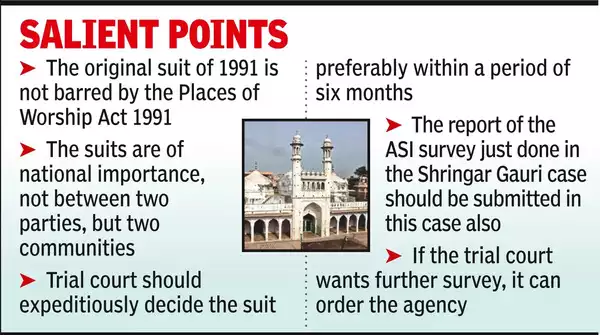Places of Worship Act: Ongoing Supreme Court Debate
Why in the news?
The Supreme Court case on the Places of Worship Act, pending for four years, highlights debates over religious harmony and property claims, while local court interventions in related cases intensify scrutiny and controversies across India.
Overview of the Places of Worship Act Case:
- The Places of Worship (Special Provisions) Act, 1991, prohibits changing the character of religious places as they existed on August 15, 1947.
- Petitions challenging the Act argue that it restricts Hindus, Jains, Buddhists, and Sikhs from reclaiming sites allegedly encroached upon by invaders.
- The case has been pending in the Supreme Court for four years, with no response from the Union government.
Legal and Constitutional Debates
- The All India Muslim Personal Law Board defends the Act, stating it upholds fraternity, secularism, and the Constitution’s Basic Structure.
- Muslim parties reference the Ayodhya verdict, which emphasized the Act’s role in preserving historical and religious harmony.
- Critics of petitions challenging the Act argue that they misuse public interest litigation to undermine the statute’s intent.
Parallel Developments in Local Courts
- Multiple civil suits in Rajasthan and Uttar Pradesh challenge the origins of mosques, alleging they were built over temples.
- A Rajasthan court is examining claims about the Ajmer Sharif Dargah.
- In Sambhal, a court ordered a survey of the Shahi Jama Masjid.
- In the Gyanvapi mosque case, the Supreme Court allowed a scientific survey without damaging the structure.
- In January 2023, the Supreme Court stayed a High Court order for a survey of the Shahi Eidgah, linked to claims about Lord Krishna’s birthplace.
- Muslim parties argue these suits reflect a pattern of incremental challenges to religious sites.
Role of Places of Worship Act, 1991:
- Background: Enacted to address disputes like Gyanvapi and Shahi Idgah, preserving the status quo of places of worship as on August 15, 1947.
- Objective: Prevents new claims over historical status; ensures communal harmony.
- Main Features:
- Religious character frozen on August 15, 1947.
- Bars conversion of worship sites to other religions/denominations.
- Terminates legal proceedings on pre-1947 changes; exceptions for post-1947 disputes.
- Exceptions: Excludes ancient monuments and Babri Masjid-Ayodhya case.
- Penal Provisions: Imprisonment (up to 3 years) and fine for violations.
Sources Referred:
PIB, The Hindu, Indian Express, Hindustan Times




